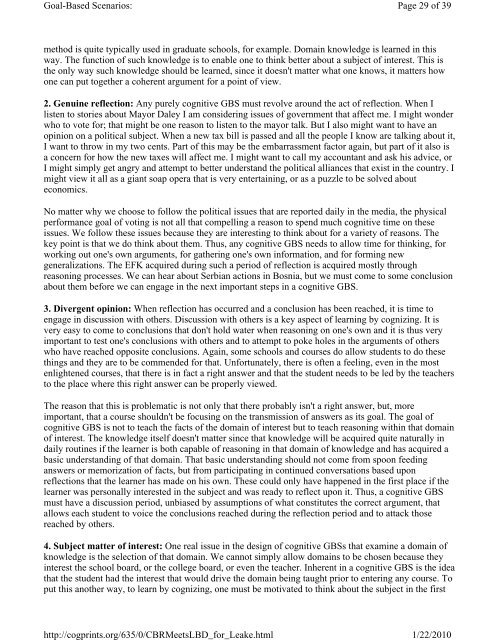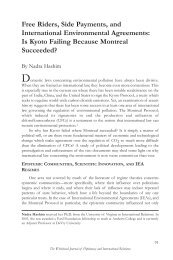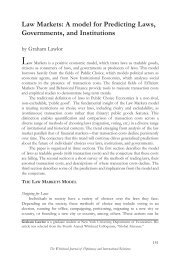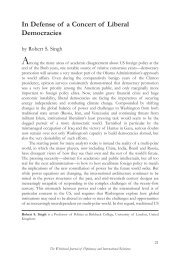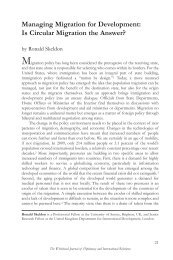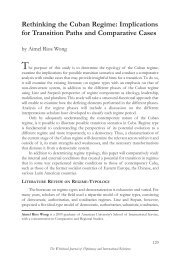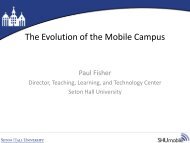Case-Based Reasoning Meets Learning by Doing
Case-Based Reasoning Meets Learning by Doing
Case-Based Reasoning Meets Learning by Doing
You also want an ePaper? Increase the reach of your titles
YUMPU automatically turns print PDFs into web optimized ePapers that Google loves.
Goal-<strong>Based</strong> Scenarios:<br />
Page 29 of 39<br />
method is quite typically used in graduate schools, for example. Domain knowledge is learned in this<br />
way. The function of such knowledge is to enable one to think better about a subject of interest. This is<br />
the only way such knowledge should be learned, since it doesn't matter what one knows, it matters how<br />
one can put together a coherent argument for a point of view.<br />
2. Genuine reflection: Any purely cognitive GBS must revolve around the act of reflection. When I<br />
listen to stories about Mayor Daley I am considering issues of government that affect me. I might wonder<br />
who to vote for; that might be one reason to listen to the mayor talk. But I also might want to have an<br />
opinion on a political subject. When a new tax bill is passed and all the people I know are talking about it,<br />
I want to throw in my two cents. Part of this may be the embarrassment factor again, but part of it also is<br />
a concern for how the new taxes will affect me. I might want to call my accountant and ask his advice, or<br />
I might simply get angry and attempt to better understand the political alliances that exist in the country. I<br />
might view it all as a giant soap opera that is very entertaining, or as a puzzle to be solved about<br />
economics.<br />
No matter why we choose to follow the political issues that are reported daily in the media, the physical<br />
performance goal of voting is not all that compelling a reason to spend much cognitive time on these<br />
issues. We follow these issues because they are interesting to think about for a variety of reasons. The<br />
key point is that we do think about them. Thus, any cognitive GBS needs to allow time for thinking, for<br />
working out one's own arguments, for gathering one's own information, and for forming new<br />
generalizations. The EFK acquired during such a period of reflection is acquired mostly through<br />
reasoning processes. We can hear about Serbian actions in Bosnia, but we must come to some conclusion<br />
about them before we can engage in the next important steps in a cognitive GBS.<br />
3. Divergent opinion: When reflection has occurred and a conclusion has been reached, it is time to<br />
engage in discussion with others. Discussion with others is a key aspect of learning <strong>by</strong> cognizing. It is<br />
very easy to come to conclusions that don't hold water when reasoning on one's own and it is thus very<br />
important to test one's conclusions with others and to attempt to poke holes in the arguments of others<br />
who have reached opposite conclusions. Again, some schools and courses do allow students to do these<br />
things and they are to be commended for that. Unfortunately, there is often a feeling, even in the most<br />
enlightened courses, that there is in fact a right answer and that the student needs to be led <strong>by</strong> the teachers<br />
to the place where this right answer can be properly viewed.<br />
The reason that this is problematic is not only that there probably isn't a right answer, but, more<br />
important, that a course shouldn't be focusing on the transmission of answers as its goal. The goal of<br />
cognitive GBS is not to teach the facts of the domain of interest but to teach reasoning within that domain<br />
of interest. The knowledge itself doesn't matter since that knowledge will be acquired quite naturally in<br />
daily routines if the learner is both capable of reasoning in that domain of knowledge and has acquired a<br />
basic understanding of that domain. That basic understanding should not come from spoon feeding<br />
answers or memorization of facts, but from participating in continued conversations based upon<br />
reflections that the learner has made on his own. These could only have happened in the first place if the<br />
learner was personally interested in the subject and was ready to reflect upon it. Thus, a cognitive GBS<br />
must have a discussion period, unbiased <strong>by</strong> assumptions of what constitutes the correct argument, that<br />
allows each student to voice the conclusions reached during the reflection period and to attack those<br />
reached <strong>by</strong> others.<br />
4. Subject matter of interest: One real issue in the design of cognitive GBSs that examine a domain of<br />
knowledge is the selection of that domain. We cannot simply allow domains to be chosen because they<br />
interest the school board, or the college board, or even the teacher. Inherent in a cognitive GBS is the idea<br />
that the student had the interest that would drive the domain being taught prior to entering any course. To<br />
put this another way, to learn <strong>by</strong> cognizing, one must be motivated to think about the subject in the first<br />
http://cogprints.org/635/0/CBR<strong>Meets</strong>LBD_for_Leake.html<br />
1/22/2010


